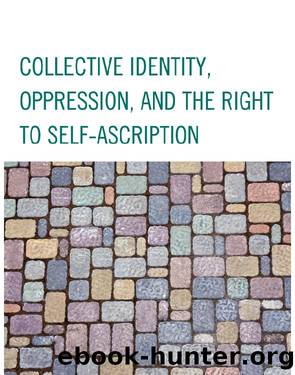Collective Identity, Oppression, and the Right to Self-Ascription by Pierce Andrew J.;

Author:Pierce, Andrew J.;
Language: eng
Format: epub
Publisher: Lexington Books
Chapter Three
Identity Politics within the Limits of Deliberative Democracy
In the first chapter of this book, I began with a critique of multicultural liberalism based upon its inability to adequately address the issue of oppression: the ways that oppression problematizes the group concepts that it employs as well as the theory of group rights that it develops. One of the main problems with this view is that it understands group membership in what I have called intentional terms. That is, it sees group membership as paradigmatically consisting of the aggregation of conscious, voluntary, individual choices about who one associates with and why. This model of group membership, I have argued, does not capture (and even obfuscates) the nature of membership in oppressed groups, which are based largely on external, nonvoluntary forces. Yet I distinguished a descriptive intentionalism of this sort from normative intentionalism, in order to capture the insight that groups ought to be able to self-ascribe their collective identity, even if they are currently prevented from doing so in oppressive societies like our own. In the second chapter, I developed the guiding idea of normative intentionalism in terms of a âright to self-ascription.â I showed how that right could fit within a Habermasian theory of democracy appropriately supplemented by Honnethâs morally infused notion of âstruggles for recognition,â as well as an âidentity politicsâ that both see as crucial to the practice of democracy and the justification of rights. In this chapter, I will flesh out this notion of identity politics and defend it against the many objections that have been raised by that controversial notion. In particular, I will demonstrate that identity politics properly conceived does not uncritically fetishize identity, nor does it legitimize any and all collective identities. Rather, by understanding how collective identity is discursively constructed, and thus governed internally by certain rules of discourse, it becomes clear that identity politics can be seen as a normative enterprise crucial to a functioning democratic society, and not just as a politics of self-interest located at the level of groups rather than individuals.
Such an analysis must take care not to conflate its ideal and nonideal aspects, however. Just as one must distinguish between descriptive and normative intentionalism in order not to overlook oppressed groups, one must distinguish between what might be called retributive identity politicsâidentity politics undertaken by oppressed groups aimed at ending their oppressionâand the kind of identity politics that would remain a crucial part of ideal democratic functioning even in non-oppressive societies. As Linda Alcoff nicely summarizes, âthe desire to be free of oppressive stereotypes does not necessarily lead to the desire to be free of all identity.â[1] The goal of shedding oppressive stereotypes, then, does not exhaust the scope of identity politics. Rather, insofar as collective identity provides the context within which even ideal democratic deliberation takes place (as I argued above), one must also theorize the role of collective identity in relation to the ideal of democracy itself. I will refer to this latter kind of
Download
This site does not store any files on its server. We only index and link to content provided by other sites. Please contact the content providers to delete copyright contents if any and email us, we'll remove relevant links or contents immediately.
Cecilia; Or, Memoirs of an Heiress — Volume 1 by Fanny Burney(31331)
Cecilia; Or, Memoirs of an Heiress — Volume 3 by Fanny Burney(30933)
Cecilia; Or, Memoirs of an Heiress — Volume 2 by Fanny Burney(30889)
The Great Music City by Andrea Baker(21262)
We're Going to Need More Wine by Gabrielle Union(18072)
Bombshells: Glamour Girls of a Lifetime by Sullivan Steve(13107)
Pimp by Iceberg Slim(12929)
All the Missing Girls by Megan Miranda(12746)
Fifty Shades Freed by E L James(12448)
Norse Mythology by Gaiman Neil(11880)
Talking to Strangers by Malcolm Gladwell(11874)
Crazy Rich Asians by Kevin Kwan(8347)
Mindhunter: Inside the FBI's Elite Serial Crime Unit by John E. Douglas & Mark Olshaker(7833)
The Lost Art of Listening by Michael P. Nichols(6469)
Enlightenment Now: The Case for Reason, Science, Humanism, and Progress by Steven Pinker(6405)
Bad Blood by John Carreyrou(5766)
The Four Agreements by Don Miguel Ruiz(5510)
Weapons of Math Destruction by Cathy O'Neil(5034)
We Need to Talk by Celeste Headlee(4868)
